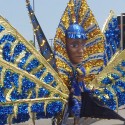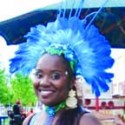Dr. Christopher Spence, Director of the TDSB
The director of the TDSB has a track record of helping parents and teachers let go of old-school idea for reaching kids
BY: Saada Branker
During his 15 years working as a senior administrator in education, Dr. Christopher Spence has been called a multitude of things: leader, organizer, visionary, author. Now the title “Tweep” can be added to that litany.
It’s hard to imagine the director of education for the Toronto District School Board (TDSB) sharing what he ponders on any given day with the social networking world on Twitter. But that’s precisely what Spence is doing.
“I just got back from the Academy at George Harvey, a fantastic program that supports leadership development and incoming students,” wrote Spence in one entry. Another: “Silence the gun violence! It pains me to see how many young people are choosing violence as a way of life. A lack of education is a factor.”
Spence’s web presence — a page on the revamped TDSB website entitled, “Chris’ Place” coupled with his tweeting on Twitter — is one way he keeps everyone informed about the public school board’s stake in education.
With its $2 billion budget, the TDSB has the distinction of being the largest board in Canada and the fourth largest in North America. Its size and diversity are among the reasons why it tapped Spence, a former athlete, educator and director of education at Hamilton-Wentworth District School Board, for this leadership position. Board trustees agree overwhelmingly that Dr. Spence is the right man for the job based on his stellar track record in education and his vitality as an organizer.
To put into perspective the scope of this new position, consider what Spence, 47, faces going in. The TDSB is governed by 22 trustees. It oversees 595 schools and, for this school year, will employ about 16,000 full-time teachers to educate more than 257,000 elementary- and secondary-school students. Each year, its Continuing Education Department registers about 165,000 people in its programs. Every one of these learners requires an array of skills and services from the TDSB in order to move successfully through life.
The monumental responsibility of fulfilling their needs comes at a time when the board has seen enrolment decline by about 4,000 students per year, prompting budget pressures and fears of school closures. Then there’s the issue of safety. Policy questions remain in the aftermath of Toronto shootings and other violent incidents on school property.
Not to forget upcoming challenges this school year in protecting students and staff against the H1N1 Swine Influenza. Whenever questions are raised about the quality of education in the public school system, somewhere bells sound. Concerned parents and teaching staff will be looking to Spence and his executives to address their points, manage the issues and make policy decisions.
“I’m still in the middle stages of my entry plan of listening, learning and leading,” Spence says at the TDSB headquarters on the day he meets with members of Toronto’s ethnic media in late August. The gathering is his opportunity to introduce himself. Spence speaks with ease, fielding questions in a room where empty chairs greatly outnumber actual reporters.
“I’ve now been to about 100 meetings and probably have another 100 to go to really learn about the challenges and the opportunities, and what we need to do,” he explains. “It’s my plan to bring back a report at the October board meeting that will really focus in on some high-level priorities that I’d like the board to embrace.”
During his five-year tenure at Hamilton-Wentworth, Spence helped parents and teaching staff let go of old-school ideas for reaching kids. In his well-documented perspective, the days when education was seen only as something teachers imparted upon students during class time are gone. “Now more than ever, the teacher has to follow the student, and build on what that student knows and can do,” says Spence.
He has often made a case for adult engagement: “We need to institutionalize the whole concept of a caring adult,” he says. “When you take a look at students who have successful outcomes, academic and life outcomes, the common denominator is that they have an adult in their life that cares.”
And he has talked about the importance of factoring in real-world complexities surrounding these learners, saying he was “absolutely blown away by the level of consciousness of today’s youth” and emphasizing that they “continue to provide opportunities where they get to make an impact both locally and globally.”
Spence is an advocate for closing the achievement gap — defined as what occurs when specific groups of learners don’t achieve in school at the same level. He tells reporters he believes in “raising the bar” for all students. “High expectations, like low expectations, can become a self-fulfilling prophecy,” he adds.
Had it not been for the certainty about his role in education, Spence may not have arrived where he is today. “It goes back to when I was at Simon Fraser studying criminology,” he says. It was around 1985, and Spence’s career began in professional football (he was a third-round draft pick in the CFL), but the university degree helped to raise his consciousness about youth and crime.
“I was spending a lot of time working in group homes and detention centres; I found that to be an incredibly sobering experience. I said to myself, I want to get to kids before they get here, because once they get here, society has almost given up on them.” In 1987, he reached a turning point. A torn Achilles tendon dashed his CFL career as a running back with the B.C. Lions, so Spence shifted his attention to education by going into teacher’s college. He started teaching in 1991. “That became my passion,” says Spence. “It was a great opportunity to influence and make a difference in kids’ lives and keep them on the right path.”
As a young student, what sparked that drive to achieve? “I was just really fortunate that I had great parents, but also coaches and mentors — being exposed to a sports culture that really guided me and looked out for me and insisted that I stay in school and make good decisions in the classroom,” says Spence. Primarily, his Jamaican parents and his coaches believed he’d be successful because he applied himself. “I wouldn’t say I was the most talented athlete; I wasn’t the most talented student, but I had a sense of determination and a really good work ethic.”
A good work ethic, like fuel, will get people far. In Spence’s case, he has gone all the way into the history books, being the first African Canadian to head the TDSB. He says he doesn’t put too much weight on this fact. “For me, it’s about being an educator or a leader who feels that he can make a difference.
“[But] there could be no leadership without followship, and I don’t think people are going to follow you because of your background. They’re going to follow you because of who you are, and what you stand for and what you hope to accomplish,” says the married father of two children.
“My wife Marcia and my kids have inspired me throughout this journey. Hopefully, having a compelling vision and being able to articulate that vision will inspire people and motivate people. The fact that I come from a diverse background is just value-added.” Spence says it’s more about the effect his leadership will have on young students. “I want kids to look at me and say, ‘That could be me. Anything is possible.’”
Also read Encouraging reading among boys and discover the programs Dr. Spence has put in place to encourage young boys to read.








[...] It’s been debated and studied around the world, and now the question of whether co-ed education is unsuitable for some students has made its way to Toronto. With various research, the Toronto District School Board (TDSB) is addressing the issue by creating distinctive environments so that every one of the 250,000 children under its umbrella has the opportunity to succeed. The single-sex schools, called the Girls’ Leadership Academy and the Boys’ Leadership Academy, are two of the TSDB’s “programs of choice”, announced in 2009 by newly appointed director of education Chris Spence. [...]
Leave your response!